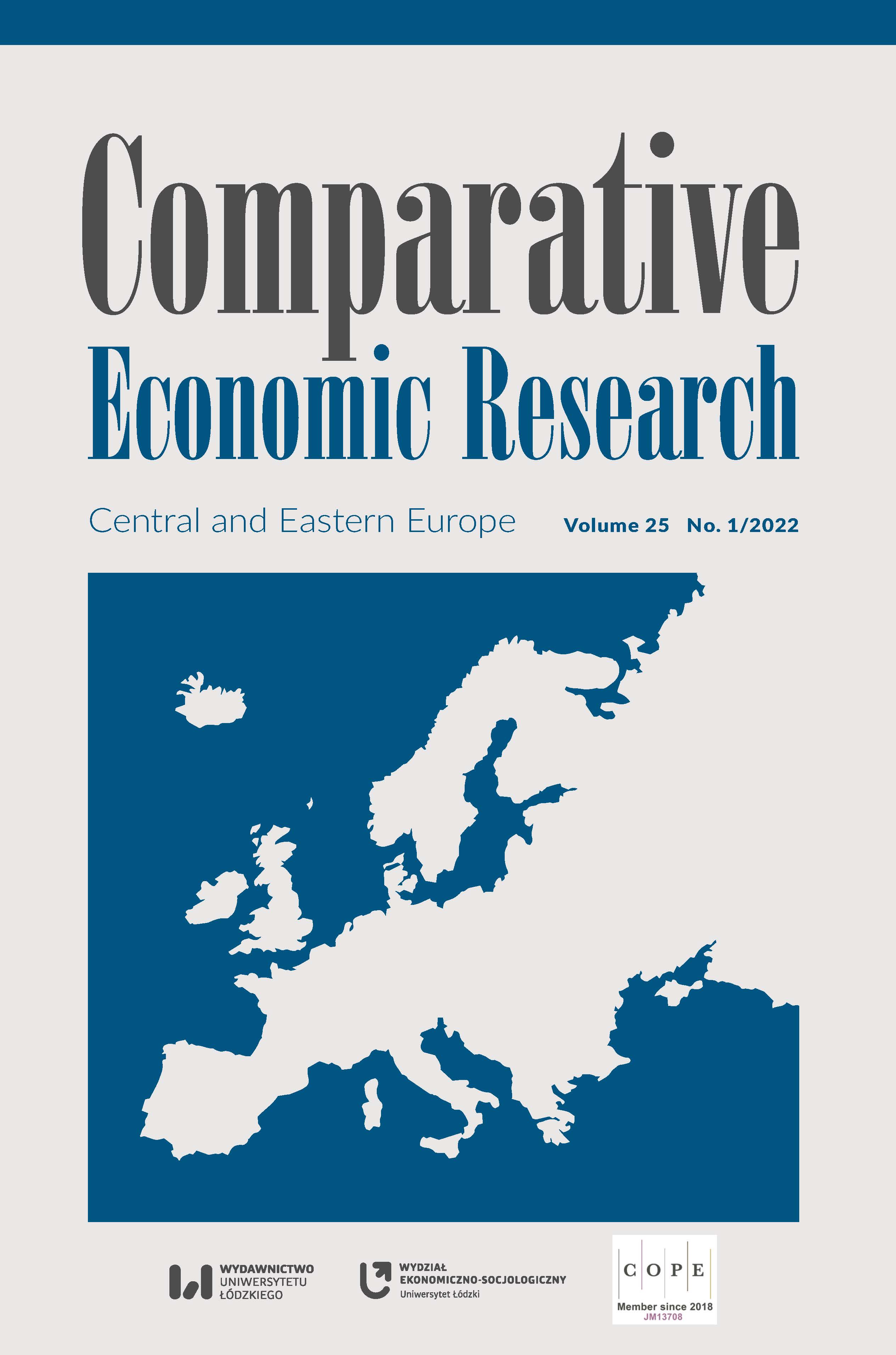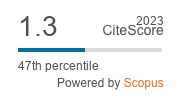Human Capital Development, Remittances, and Poverty in Central and Eastern European Countries: What Do the Data Tell Us?
DOI:
https://doi.org/10.18778/1508-2008.25.02Keywords:
human capital development, remittances, poverty, panel data analysisAbstract
The study investigates the impact of human capital development on poverty in Central and Eastern European Countries (CEECs) using dynamic generalized methods of moments (GMM), fixed effects, random effects, and pooled ordinary least squares (OLS) with panel data ranging from 2008 to 2019. Using the same panel data analysis methods and data set, the study also explored the influence of the complementarity between human capital development and personal remittances on poverty in CEECs. What triggered the investigation into this topic is that the available literature on the subject matter is mixed, divergent, and very much conflicting. The lag of poverty, remittances, the interaction between human capital development and remittances, trade openness, unemployment, and partly financial development significantly increased infant mortality rates in CEECs. On the other hand, human capital development, infrastructural development, and partly financial development were found to have reduced infant mortality rates. These results mean that human capital development, financial development, and infrastructural development reduced poverty in CEECs during the period under study. Central and Eastern European Countries are therefore urged to craft and implement financial development, infrastructural development, and human capital development enhancement policies to combat poverty. Future empirical research could also investigate at what threshold the level of human capital development, financial and infrastructural development would poverty be significantly reduced in CEECs.
Downloads
References
Adekoya, O.D. (2018), Impact of human capital development on poverty alleviation in Nigeria, “International Journal of Economics and Management Sciences”, 7 (4), pp. 1–8.
Google Scholar
Afzal, M., Malik, M.E., Begum, I., Sarwar, K., Fatima, H. (2010), Relationship among education, poverty and economic growth in Pakistan: An Econometric analysis, “Journal of Elementary Education”, 22 (1), pp. 23–45.
Google Scholar
Ahmad, R., Bashir, F., Hussain, A. (2018), Human capital, governance and poverty reduction: A panel data analysis, “Review of Economics and Development Studies”, 4 (1), pp. 103–113, https://doi.org/10.26710/reads.v4i1.285
Google Scholar
DOI: https://doi.org/10.26710/reads.v4i1.285
Anyanwu, J.C., Erhijakpor, A.E.O. (2010), Do international remittances affect poverty in Africa?, “African Development Review”, 22 (1), pp. 51–91, https://doi.org/10.1111/j.1467-8268.2009.00228.x
Google Scholar
DOI: https://doi.org/10.1111/j.1467-8268.2009.00228.x
Awan, M.S., Iqbal, N., Waqas, M. (2011), The impact of human capital on urban poverty: The case of Sargodha City, “Journal of Sustainable Development”, 4 (1), pp. 143–150, https://doi.org/10.5539/jsd.v4n1p143
Google Scholar
DOI: https://doi.org/10.5539/jsd.v4n1p143
Aye, G.C., Edoja, P.E. (2017), Effect of economic growth on C02 emission in developing countries: Evidence from a dynamic panel threshold model, “Cogent Economics and Finance”, 5 (1), pp. 1–22, https://doi.org/10.1080/23322039.2017.1379239
Google Scholar
DOI: https://doi.org/10.1080/23322039.2017.1379239
Azher, B.A. (1995), Rural savings: Their magnitude, determinants and mobilization, “Pakistan Development Review”, 34 (4), pp. 779–786, https://doi.org/10.30541/v34i4IIpp.779-788
Google Scholar
DOI: https://doi.org/10.30541/v34i4IIpp.779-788
Babasanya, A.O., Oseni, L.O., Subair, A.S. (2018), Human capital development: A catalyst for achieving SDGS in Nigeria, “Acta Universitatis Danubius. Oeconomica”, 14 (4), pp. 25–41.
Google Scholar
Bidemi, O.J., Sylvester, U., Bright, A.K. (2018), Human capital investment and poverty reduction in Nigeria, “International Journal of Research in Business, Economics and Management”, 2 (1), pp. 104–115.
Google Scholar
Boukhatem, J. (2016), Assessing the direct effect of financial development on poverty reduction in a panel of low and middle‑income countries, “Research in International Business and Finance”, 37, pp. 214–230, https://doi.org/10.1016/j.ribaf.2015.11.008
Google Scholar
DOI: https://doi.org/10.1016/j.ribaf.2015.11.008
Cattaneo, C. (2005), International migration and poverty: A cross country analysis, “World Economy”, 32 (8), pp. 1180–1202, https://doi.org/10.1111/j.1467-9701.2009.01178.x
Google Scholar
DOI: https://doi.org/10.1111/j.1467-9701.2009.01178.x
Chaudhry, I.S., Rahman, S. (2009), The impact of gender inequality in education on rural poverty in Pakistan: An empirical analysis, “European Journal of Economics, Finance and Administrative Sciences”, 15, pp. 174–188.
Google Scholar
Chukwubudom, C.J. (2016), Impact of human capital development on poverty reduction in Nigeria, Munich Personal RePEc Archive Paper Number 74696.
Google Scholar
Daepp, M.I.G., Arcaya, M.C. (2017), The effect of health on socioeconomic status: using instrumental variables to revisit a successful randomized controlled trial, “Economics & Human Biology”, 27, pp. 305–314, https://doi.org/10.1016/j.ehb.2017.09.002
Google Scholar
DOI: https://doi.org/10.1016/j.ehb.2017.09.002
David, O.O.K., Awe, E.O., Sesan, A. (2018), Perceived relation of human capital development and poverty alleviation in Nigeria (1970–2016): A linear probability model approach, “International Journal of Development Research”, 8 (3), pp. 19687–19694.
Google Scholar
Ewubare, D.B., Mark, T. (2018), Human capital development and poverty reduction in Nigeria, “The Asian Institute of Research Journal of Economics and Business”, 1 (2), pp. 150–163, https://doi.org/10.31014/aior.1992.01.02.13
Google Scholar
DOI: https://doi.org/10.31014/aior.1992.01.02.13
Im, K.S., Pesaran, M.H., Shin, Y. (2003), Testing unit roots in heterogeneous panels, “Journal of Econometrics”, 115 (1), pp. 53–74, https://doi.org/10.1016/S0304-4076(03)00092-7
Google Scholar
DOI: https://doi.org/10.1016/S0304-4076(03)00092-7
Jahan, S., McCleery, R. (2005), Making infrastructure work for the poor: Synthesis report of four country studies – Bangladesh, Senegal, Thailand and Zambia, UNDP, New York.
Google Scholar
Kao, C. (1999), Spurious regression and residual‑based tests for co‑integration in panel data, “Journal of Econometrics”, 90 (1), pp. 247–259, https://doi.org/10.1016/S0304-4076(98)00023-2
Google Scholar
DOI: https://doi.org/10.1016/S0304-4076(98)00023-2
Levin, A., Lin, C.F., Chu, C.S.J. (2002), Unit root tests in panel data: Asymptotic and finite‑sample properties, “Journal of Econometrics”, 108 (1), pp. 1–24, https://doi.org/10.1016/S0304-4076(01)00098-7
Google Scholar
DOI: https://doi.org/10.1016/S0304-4076(01)00098-7
Olopade, B.C., Okodua, H., Oladosum, M., Asaleye, A.J. (2019), Human capital and poverty reduction in OPEC member countries, “Heliyon”, 5, pp. 1–7.
Google Scholar
DOI: https://doi.org/10.1016/j.heliyon.2019.e02279
Oshio, T. (2019), Exploring the health‑relevant poverty line: a study using the data of 663,000 individuals in Japan, “International Journal of Equity Health”, 18, pp. 98–112, https://doi.org/10.1186/s12939-019-1118-8
Google Scholar
DOI: https://doi.org/10.1186/s12939-019-1118-8
Pradhan, B.K., Mahesh, M. (2014), Impact of trade openness on poverty: A panel data analysis of a set of developing countries, “Economic Bulletin”, 34 (4), pp. 2208–2219.
Google Scholar
Rajan, R., Zingales, L. (1998), Financial dependence and growth, “American Economic Review”, 88 (2), pp. 560–586.
Google Scholar
Sajjad, W., Saqib, S.E., Ali, M., Khan, M. (2019), An empirical analysis of education, earning and household expenditure financing. The case of Swabi district, “Journal of Geography and Social Sciences”, 1 (1), pp. 17–29.
Google Scholar
Tembo, J. (2018), Regional financial integration and its impact on financial sector development: The case of Southern Africa, Unpublished Doctoral Thesis, University of South Africa, Pretoria.
Google Scholar
Tsaurai, K. (2021), Is economic growth a panacea for poverty reduction in emerging markets?, “The Journal of Developing Areas”, 55 (2), pp. 22–41, https://doi.org/10.1353/jda.2021.0041
Google Scholar
DOI: https://doi.org/10.1353/jda.2021.0041
Wang, Q., Hua, Y., Tao, R., Moldovan, N. (2021), Can health human capital help the Sub‑Saharan Africa out of the poverty trap? An ARDL model approach, “Original Research”, 9, pp. 1–11, https://doi.org/10.3389/fpubh.2021.697826
Google Scholar
DOI: https://doi.org/10.3389/fpubh.2021.697826
Winters, P., Chiodi, V. (2008), Human capital investment and long‑term poverty reduction in rural Mexico, Paris School of Economics Working Paper Number 2008–51.
Google Scholar
Wisniewski, M., and Stead, R. (1996), Foundation quantitative methods for business, Pitman Publishing, London.
Google Scholar
Downloads
Published
How to Cite
Issue
Section
License

This work is licensed under a Creative Commons Attribution-NonCommercial-NoDerivatives 4.0 International License.











